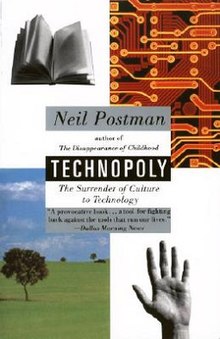Technopoly

Original paperback version cover
|
|
| Author | Neil Postman |
|---|---|
| Country | United States |
| Language | English |
| Subject | Technology and society |
| Published | 1992 |
| Media type | Print (Paperback and Hardcover) |
Technopoly: The Surrender of Culture to Technology is a book by Neil Postman published in 1992 that describes the development and characteristics of a "technopoly". He defines a technopoly as a society in which technology is deified, meaning “the culture seeks its authorisation in technology, finds its satisfactions in technology, and takes its orders from technology”. It is characterised by a surplus of information generated by technology, which technological tools are in turn employed to cope with, in order to provide direction and purpose for society and individuals.
Postman considers technopoly to be the most recent of three kinds of cultures distinguished by shifts in their attitude towards technology – tool-using cultures, technocracies, and technopolies. Each, he says, is produced by the emergence of new technologies that "compete with old ones…mostly for dominance of their worldviews".
According to Postman, a tool-using culture employs technologies only to solve physical problems, as spears, cooking utensils, and water mills do, and to "serve the symbolic world" of religion, art, politics and tradition, as tools used to construct cathedrals do. He claims that all such cultures are either theocratic or "unified by some metaphysical theory", which forced tools to operate within the bounds of a controlling ideology and made it "almost impossible for technics to subordinate people to its own needs".
In a technocracy, rather than existing in harmony with a theocratic world-view, tools are central to the "thought-world" of the culture. Postman claims that tools "attack culture…[and] bid to become culture", subordinating existing traditions, politics, and religions. Postman cites the example of the telescope destroying the Judeo-Christian belief that the Earth is the centre of the solar system, bringing about a "collapse…of the moral centre of gravity in the West".
Postman characterises a technocracy as compelled by the "impulse to invent", an ideology first advocated by Francis Bacon in the early 17th Century. He believed that human beings could acquire knowledge about the natural world and use it to "improve the lot of mankind", which led to the idea of invention for its own sake and the idea of progress. According to Postman, this thinking became widespread in Europe from the late 18th Century.
...
Wikipedia
